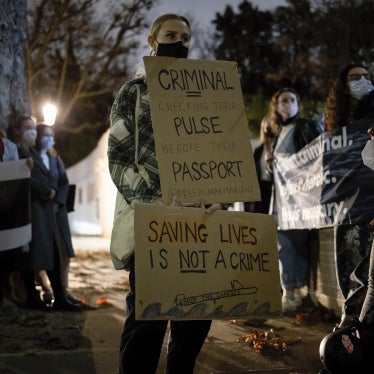Democracy must be grounded in human rights. To many, that is obvious, but increasingly, we see some in Europe suggesting that democracy is about merely winning elections and then doing whatever the voters are deemed to want. Democracy, for them, becomes a kind of “dictatorship of the majority.”
Yes, government should reflect majority preferences as expressed in periodic, free and fair elections, but it must also be limited by human rights safeguards and the rule of law. There are certain things a government should be barred from doing even if most voters endorse them, such as imposing the death penalty, imprisoning people on political grounds, curtailing their ability to speak and meet freely, or discriminating on grounds of gender, race, ethnicity, religion, or sexual orientation.
With that deeper understanding in mind, it is clear that this is a difficult moment for democracy – in both Europe and the United States. The ability to uphold human rights depends ultimately on public acceptance. Yet today, more people are questioning these fundamental human rights principles than at any time in a generation or more.
The causes of this rising intolerance are easy enough to discern. These are times of economic insecurity, when many people feel they are falling behind. These are also times of physical insecurity, when people enjoying a night out listening to music at a Paris concert hall or watching fireworks in Nice or waiting to board a flight in Brussels are randomly cut down. And these are times of cultural insecurity, when the arrival of large numbers of migrants provokes fear of a loss of national or European identity.
In such times, there is a tendency to retrench, to seek shelter among those who seem most like us, to close the door to others. That instinct provides the platform for the voices of hate and intolerance that have gained such ascendancy. Sadly, many politicians are eager to exploit these fears for political gain.
Given the enormous stakes, you would think that more moderate political leaders would be sounding the alarm, that they would be inveighing against the demagogues, that they would be affirming the centrality of rights and liberal values to our democracies.
But few are standing up to the challenge. Some leaders are simply lying low, hoping the winds of hate might blow over, that silence might somehow win the debate. Others are trying to defang the demagogues by emulating them, embracing xenophobic policies or code words in the naïve hope that they might woo the extremists’ supporters as they legitimize their views. There have been notable exceptions. Angela Merkel, Justin Trudeau, and Alexis Tsipras have spoken positively about refugees. But too few political leaders are pushing back, let alone making a positive case for liberal democracy.
That case is needed: not just a defense of principle—to explain that demonization and intolerance are wrong—but also one of pragmatism—to show that the populist agenda, far from the panacea advertised, will leave us substantially worse off.
For example, it is important to explain that Islamophobia is the last thing we need if we want to integrate our immigrant communities, undermine radicalization, and encourage community cooperation with the police. Indeed, ISIS could not prescribe a better recruitment or operational plan than the Islamophobia of the populists.
And we should ask tough questions about plans to sacrifice our rights in the name of fighting terrorism. Does France really need an endlessly renewed state of emergency, when its weakened safeguards have led to police abuse against ordinary people? Or why are we so enamored of mass surveillance when we are so woefully underinvested in targeted surveillance of known suspects? Chipping away at our rights turns out to be easier than coordinating among law enforcement agencies or sharing intelligence across national borders.
Obviously I do not claim that all is well in our democracies. The populist backlash should alert us to real problems in need of repair: the poor job we have done integrating many immigrants, the undue political influence of money, the unfairness in our systems of taxation, the tendency of international trade to prioritize corporate need over labor rights and the environment, the dysfunction and division in many parts of the European Union.
An effective response to the populists must grapple with the real issues they raise as we reject the affront to our values that they represent. And we should draw strength from the kindness shown to refugees by so many ordinary Europeans.
This is not a time to put our heads in the sand. The threat to democratic principles and institutions will not recede on its own. We must all present a loud and public defense of this robust understanding of democracy – defending the rights and values that make our societies stronger.
--
Kenneth Roth is executive director of Human Rights Watch. On Twitter: @KenRoth.
--
This article was published in: De Tijd (Belgium) and Financieele Dagblad (The Netherlands), Le Monde (France), Der Standard (Austria), Το Βήμα (Greece), Átlátszó.hu (Hungary), La Repubblica (Italy), Delfi (Latvia), Rzeczpospolita (Poland), Publico (Portugal), El Español (Spain), and ETC (Sweden).









